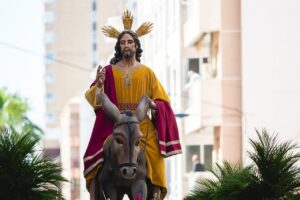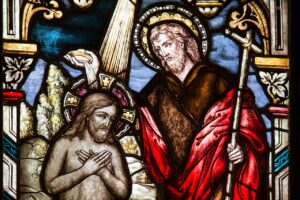Wisdom 12: 13, 16-19 (RM); Psalm 86; Romans 8: 26-27 (RM) or 12-25 (RCL); Matthew 13: 24-43 (RM) or 24-30, 36-43 (RCL).
This year I called an amnesty on the weeds. My garden is all weeds this year, except for the blackberries that the birds kindly sowed for me the past few years.
As for the weeds, they generously sowed themselves.
Doesn’t it tell us something interesting about the society and culture of first-century Palestine, that in this story an enemy comes at night to deliberately sow weeds in the farmer’s field? What a rotten thing to do. Flat-out sabotage.
Commentator Catherine Cory writes,
“On a deeper level, [this parable] should be called the Parable of Feuding Farmers, because the weeds are merely instruments designed to dishonour one’s enemy. In the ancient Near East, and in many parts of the world even today, societies operated on the notion that the enemies of one’s grandparents and parents are your enemies as well. To maintain your family’s honour, you were obligated to challenge the social status of those enemies in some way – even if it meant introducing weeds into your enemy’s field!”
The particular weed involved was called zizania or darnel, a sort of rye grass that resembles wheat and would entangle its roots around the wheat shoots, starving them of nourishment and making the task of pulling out the weeds almost impossible without also tearing out the young wheat.
Cory writes further,
“The typical farmer would have felt obligated to respond in kind, but this farmer does not retaliate and instead allows [his or her] honour to be compromised for an entire season until harvest, which is a symbol of God’s end time judgement, when the instruments of hatred can be destroyed in fire.”
Here too, as in last week’s passage from Matthew, we have two separate components: Jesus’ original story with a fairly simple point, and the point-by-point interpretation that Matthew and others laid over the top of the story. By the end of the first century Christians knew well that there were enemies out there who sought to suppress the new Christian faith that claimed exclusivity for itself and did not simply co-exist peaceably with other marginal religious cults in the Roman Empire. But Matthew goes further: he looks ahead to what the early Christians expected would be the second coming of Christ at the end of time, very soon. Granted, by about the year 85 it clearly wasn’t as soon as the first generation of Christians had expected. Still, the very idea provided a hoped-for vindication of the Christians’ faith in the risen Christ coupled with the expectation of a fiery end to their enemies.
From our perspective in the year 2023, we’ve seen ‘em come and we’ve seen ‘em go, those self-styled prophets who claim to know exactly when the world will end. They herd their followers up onto a mountaintop to await Christ coming in glory to sweep them up with him to heaven. And always, the date was wrong, or the rapture postponed.
So what can we do with this passage today? The core message makes sense in that all time is in God’s hands, not ours. We do not control times or seasons. That was the original point of the parable, to trust God as we sow our seeds of goodness, of healing, of justice, as we deal with frustrations, discouragement, or just plain evil. But this trust and patience is not to be confused with passivity. Commentator John T. Carroll, paraphrasing Desmond Tutu, writes,
“Oppressive evil needs to be named and vigorously opposed. Silence, neutrality or failure to act in the face of oppression only serves the interests of the oppressor.”
Let’s draw a deep breath of energy and commitment from this story. And, carefully but firmly, pull a weed or two.
© Susan K. Roll
Susan Roll retired from the Faculty of Theology at Saint Paul University, Ottawa, in 2018, where she served as Director of the Sophia Research Centre. Her research and publications are centred in the fields of liturgy, sacraments, and feminist theology. She holds a Ph.D. from the Catholic University of Leuven (Louvain), Belgium, and has been involved with international academic societies in liturgy and theology, as well as university chaplaincy, Indigenous ministry and church reform projects.




